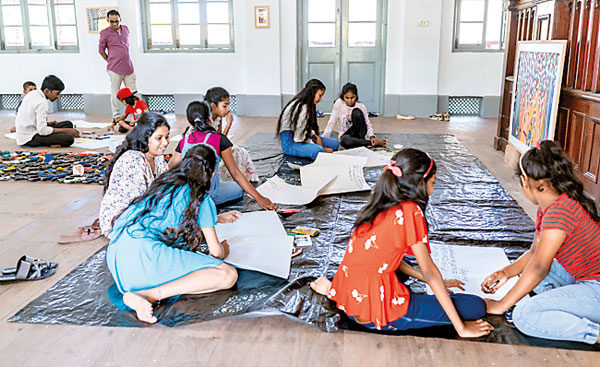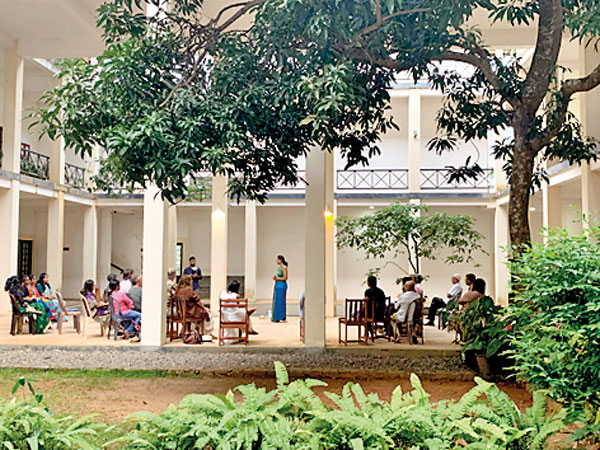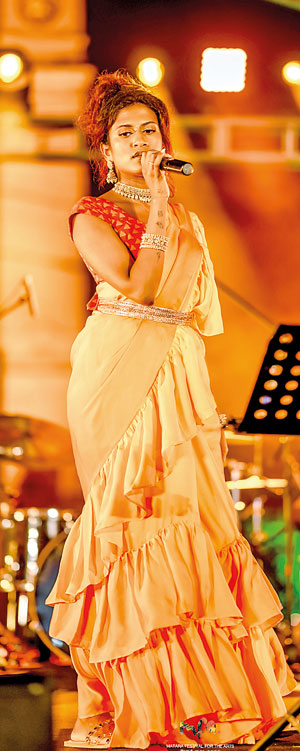Matara’s maiden arts festival opens many doors
View(s):There were no safe bets taken in putting together the Matara Festival for the Arts (MFA) inaugural edition in the Matara Fort and town. The infrastructure available in the immediate vicinity was minimal – whether it was the historic but in disrepair former Matara Court building, or the Matara River Park, which despite being readied in 2018, remained unopened, or the few restaurants or hotels close to the fort to service visitors.
And yet throughout its four-day programme that ran from February 1 – 4, there was an energetic co-mingling of various audiences for MFA’s bold exhibitions, talks, workshops and thrilling finale concert.
February 1
Day One kicked off at the University of Ruhuna’s Faculty of Fisheries with attendees from Colombo, university students from different parts of the country, and representatives of arts organizations local and international (Summerhall in Scotland, the British Council, Saskia Fernando Gallery and the Guggenheim Abu Dhabi ) coming to see what might be possible with this decentralizing of art access.
Whether it was a conversation between social researcher Radhika Hettiarachchi and MFA Art Curator Prof. Jagath Weerasinghe or a talk on photography from architect/art historian Ismeth Raheem, Theena Kumaragurunathan’s film on Deniyaya artist Pala Pothupitiye or Venuri Perera’s captivating performance art within the frame of Geoffrey Bawa’s courtyard design - the first day signalled something unique going on.
February 2
On Day 2, while visitors to the Ruhuna campus could take their first tour of the usually closed-off university campus, on the other side of town, at the Madiha beachfront of The Doctor’s House, young women from Matara, Colombo and even Belarus came together for a session on ‘Women Voicing Change’ where they shared in a multi-lingual exchange of music and ideas with festival performers – DJ Paloma Monappa from India, and singers Paula Almedia Reis from Brazil and Rolex Rasathy from the USA.

Young people drawing in the Gallery
By early evening, with the long-due opening of the Matara River Park and the exhibition at the court complex, the audience swelled to include President Ranil Wickremesinghe, former President Chandrika Kumaratunga, US Ambassador Julie Chung, and attendees from business, local government, arts and hospitality entrepreneurs from Matara and Galle and curators from Dhaka and Berlin.
There were speeches from festival director Chanchala Gunewardena, and community artist Amani Ariyarathna, as well as music by a Matara Quintet.

Venuri Perera has a rapt audience in the Ruhunu campus courtyard
At the courthouse the exhibition curated by Prof. Jagath Weerasinghe featured the works of nine leading contemporary artists – Anura Krishantha, Bilaal Raji Saheed, Firi Rahman, Hema Shironi, Muvindu Binoy, Pala Pothupitiye, Pradeep Chandrasiri, Sivasubramaniam Kajendran, and Sujeewa Kumari.
In between, there were performance artists Janani Cooray, Priyanthi Anusha and Bandu Manamperi in action.
Many walked across to the Community Open mic night, to watch performances by aspiring Matara singers and musicians at the Fort restaurant nexus that is Dutchman’s Street.
February 3
The festival was in full swing on Saturday as nearly 100 young students brought via the Theertha Collective came for a guided tour of the exhibit. Matara residents and tourists also came to see what contemporary Lankan art looked like within this long-restricted courthouse space.
The community art project, led by eight aspiring Matara artists with whom the festival had worked for over three months, presented their project centred on the stories of Matara Municipal workers, and the reimaging of discarded plastics and clothes in an innovative artistic spirit. The project on the ground floor of the courthouse was an interactive and contributive exhibit to which visitors could add through their own creative utilization of the materials

All the way from the US; Rolex Rasathy. Official festival photography by Picxus
During the day, MFA’s Workshops and Discussions curator Randhula de Silva also presented sessions including Mind-Gardening by Mayun Kaluthantri, upcycled-jewellery making by Sara Nazoor, the merger of Tech and Art by Hyperglade, a reconsideration of the artistic value of Kitch by Muvindu Binoy and an insightful discussion of the socio-economic contributions of surfing culture to the larger community by Leandro Filippin and Prithvi Virasinghe.
Then, on the bank of the famous Matara Nilwala River, the Matara River Park had its first public event – a ‘Good Market for Matara’ – in an important collaboration between the Good Market and the Matara District Secretariat. The Matara River Park was one of the last initiatives of the late Mangala Samaraweera – one part of his larger Nilwala Eliya project for extended community cultural spaces to be built on the famed riverfront.
The participants were galvanized by the opportunity and potential for the Market, and a second market is in the works for March and April.
Finally, in the evening a discussion of Invest in Matara, brought visitors from Matara, Galle, Colombo, and elsewhere down to learn if they could be part of the forward direction of the potential they were seeing in the Fort.
February 4
As the exhibit stayed open, more visitors kept coming and a community artist who had almost given up on her potential and passion before this project sold two of her first works.
And in the neighbouring Wijesekara grounds, a unique concert curated by MFA Music Curator and Music Matters Founder Sumudi Suraweera (pictured on our mag cover) saw seven bands take the stage for a six hour concert titled ‘Freedom Sounds’ – musicianship and expression free from constraints of genre, language, and censorship.
There was the boundless energy of Orange Mango, bossa nova and afro-jazz from SDP Ft. Pala, pyrotechnic infused performance of rituals and rhythms by Baliphonics, the pop-folk fusion of Amila Sanduruwan and the incredible Tamil-English carnatic and RnB stylings of Rolex Rasathy, and experimental originals of the Soul, that saw everyone celebrating freely together in dance. It all concluded with the easy-cool of Paloma’s dance blends from across the world.
‘Freely’ an original song written and performed by the festival’s community musicians supported by the mentors was a happy, harmonious ode to the joy of celebrating personal freedom and living in the moment.

Baliphonics performers in full flow
Co-Founders Jayanthi Samaraweera Gunewardena and Chanchala Gunewardena, carry on the work of their family member the late Mangala Samaraweera via the Freedom Hub in Matara, with artist and archaeologist Prof. Jagath Weerasinghe who was a collaborator of Samaraweera’s efforts of art for peacebuilding.
The festival is planning to hold a series of discussion and workshop sessions on art and music in multiple languages again in the Matara Fort in March. Follow them at @MataraForArts on Instagram and Facebook.
Searching for that next furry family member but couldn’t find one in your area? Hitad.lk has the solution with our extensive listings of dogs for sale in Sri Lanka!


